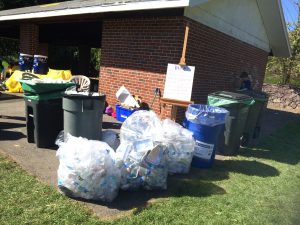Hastings Green Team – Lunch Composting
Americans account for only five percent of the world’s population but create half of the globe’s solid waste (source: Scientific America). At Hastings, we want to change that.
- Reduce the lunch waste (since 2012, we have cut the number of 55-gallon bags of trash per lunch day from 6 to 1/2)
- Help Hastings students learn to recycle and save the environment
- Recycling/composting at home
- Packing your child’s lunch with reusable food and drink containers
- Talking to your child about the recycling/composting at school
- Volunteering at special events (below is a snapshot of how much we recycled and composted at 2017 Hastings Harvest Run)
We hope that the initiative will be an educational experience for our children and that it will have a positive and lasting impact on their lives and the world in general.
Our three-step trash reduction process:
|
Trash bin
|
Throw out plastic utensils, straws, Ziploc bags, Foil-type juice pouches (like Capri Sun), milk and juice boxes (including the liquid in them), plastic containers
|
|
Compost bin
|
Dump and tap – dump leftover food out of plastic containers and tap on the side of the compost bin to make the containers as empty as possible
|
|
Floor
|
Stack trays on the floor (they will go in the compost bin in stacks after the last lunch to reduce volume)
|
Our goal is to have students compost correctly even on the days when parent volunteers are not present. To achieve this, we encourage the children to work independently by:
- Assisting them verbally and
- Reminding younger ones to stack trays on the floor and to take their time sorting things
You are not recycling? We are not. It’s a strategic decision given the limitations on staff and volunteer time. Realistically, composting is much better than recycling so LPS made composting the priority for this wild COVID year.
Milk goes in the trash? Yup, both the milk itself and the container. Milk containers are very difficult to recycle and very few recycling companies actually have the machine required. The milk messes up the compost liners. When things return to normal we will have our learners pour the milk in a bucket or sink like they did before.
Plastic bags go in the trash? This is another place where manufacturers tell us things **can** be recycled, but they don’t say how difficult it is to recycle them. If you want to recycle plastic bags, there are bins for plastic bags outside of grocery stores.
What waste management is doing the composting for the schools? We have a new vendor, Garbage to Garden
What’s your favorite podcast? We are LOVING How to Save a Planet. After listening to the one on soil (July 8) you might binge ALL the episodes.
How do you get in touch with the Green Team at other schools? https://www.lexingtongreenteams.org/ plus you’ll find tons of cool stuff 😉
What about the bees? The bees… While it certainly is more scary for folks who have allergies, we spend 3 hours by the trash and compost each day none of our volunteers have been stung. The bees are not aggressive when we can help the students stay calm. As soon as the bees realize that our students are not flowers, they move on.
Helpful videos Hastings students have enjoyed on All School Meetings:
- Composting for Kids by Highfields Composting
- Recycling & Composting in Lunchrooms: What-Goes-Where by Media Operations Center Seattle Public Schools
- Recycling and Composting at Garfield High School (Seattle, WA)
- How Recycling works by Reading Rainbow “How Trash Is Recycled” with LeVar Burton
- Earth Day song on Reduce, Reuse, and Recycle “Going Green” by Harry Kindergarten Music

